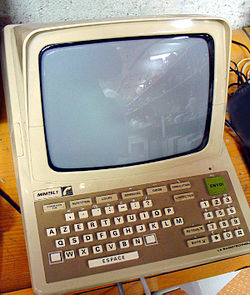 When I first came to the US, one project that we had going on at VLSI Technology was an ASIC design being done by a French company called Telic. The chip would go into something called “Minitel” which the France Telecom (actually still the PTT since post and telecomunications had not yet been separated) planned to supply to most customers in the country. One function of Minitel was to allow you to look up phone numbers and the system was paid for by the fact that France Telecom would no longer need to print white-pages phone directories and distribute them.
When I first came to the US, one project that we had going on at VLSI Technology was an ASIC design being done by a French company called Telic. The chip would go into something called “Minitel” which the France Telecom (actually still the PTT since post and telecomunications had not yet been separated) planned to supply to most customers in the country. One function of Minitel was to allow you to look up phone numbers and the system was paid for by the fact that France Telecom would no longer need to print white-pages phone directories and distribute them.
But that wasn’t the only use. Lots of what today we would call websites came into existence allowing catalog shopping, chat-rooms, booking travel and, yes, porn (minitel rose). It was a big success. Remember this is in the early to mid 1980s, long before the Internet escaped from its roots in academia and the military. Since nobody really yet had computers at home, Minitel included a keyboard and screen. It connected over the phone lines using modem technology (at 1200 bits/second download and 75 bits/second upload).
I didn’t know it at the time, but I would end up moving to France and living there for over 5 years, and so ended up making extensive use of Minitel. The service had several tiers. You would dial 3611 for a searchable phone directory which was free. Other numbers would have nominal per-minute charge for things like catalog shopping (where the site itself wasn’t really the main business) and premium numbers for things like chat-rooms (where using the site was the business).
Of course, in the end, this turned out to be a dead end as general purpose computers became widespread, the Internet became commercial and, eventually, we all have broadband. There has been a lot of debate about whether Minitel helped or hindered Internet penetration in France. Since there were so many primitive terminals in use, people didn’t need to buy a computer and they could still have many of the benefits of the Internet. But eventually as people had computers anyway, and as data speeds went to 56 kbit/second modems and then broadband, it was increasingly obsolete. Last week, France Telecom finally retired the service on June 30th.
Being first is sometimes a hindrance compared to waiting. The London Underground is primitive compared to many subway systems (especially new ones in Asia) because it was partially built in the 1860s before people could tunnel through hard rock effectively, so it is unnecessarily windy, and the tube diameter is comparatively small (so small that there is no room for air-conditioning on the trains).
EDA startup companies often try and commercialize some technology before the market really requires it, and this typically means that the company runs out of money or considerably dilutes all the founders. Often it is a different company that finally finds success in the market.
With the success of the Mac it is easy to forget that Apple’s first attempt to build a GUI-based computer was Lisa, which was a failure (not to mention Xerox’s own attempt, the Star, even earlier and more expensive).
So being first isn’t always best. It’s the second mouse that gets the cheese.
Share this post via:







CEO Interview with Aftkhar Aslam of yieldWerx